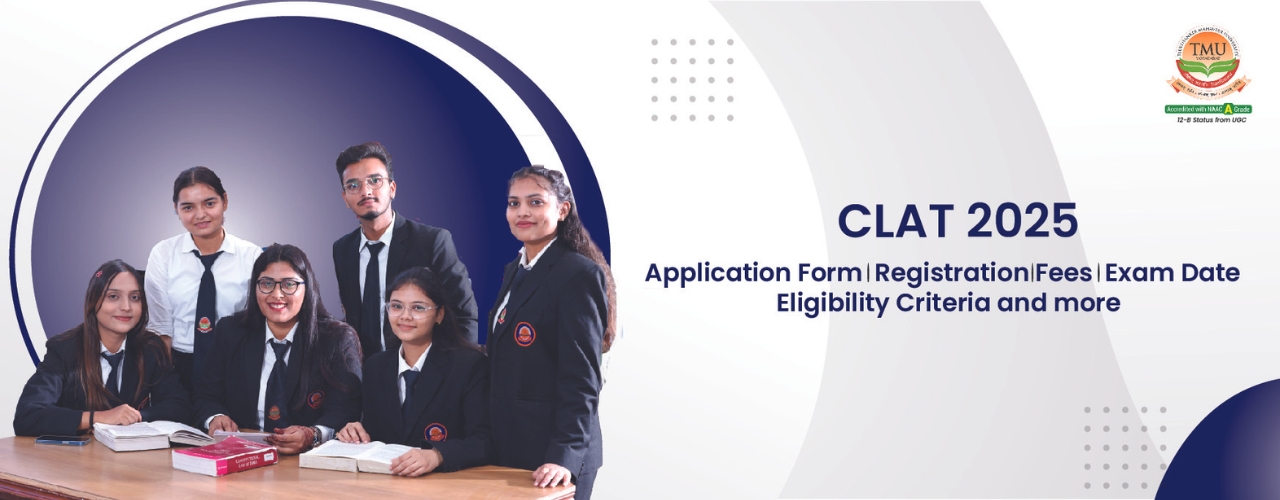CLAT 2025 Application Form, Registration Fees, Exam Date, Eligibility Criteria and more
Table of Contents
CLAT full form is Common Law Admission Test, one of India’s most prestigious and competitive national-level entrance exams for aspiring law professionals. Conducted annually by the Consortium of National Law Universities (CNLU), CLAT serves as the gateway for students aiming to pursue undergraduate (UG) and postgraduate (PG) law programs in top law schools across the country.
Known for its challenging questions and high competition, the CLAT exam evaluates candidates on areas such as English language, logical reasoning, legal aptitude, general knowledge, and current affairs. Clearing CLAT opens doors to careers as lawyers, legal advisors, corporate counsel, and other roles in the legal domain, making it a crucial step for those looking to make a mark in the field of law.
CLAT Online registrations begin from 15 July,2024on the official website of CNLU.
This program is for students, who want to apply to UG and PG law courses offered by various Colleges of India. Length of Time (2 hours in pen & Paper exams) Along with reading comprehension and verbal reasoning, the test assesses other law-related skills like legal aptitude, logical reasoning, quantitative abilities and general knowledge.
The Graduates (for UG programs) and with a Law Degree holder or its equivalent (as recognised by the appropriate higher education authority in India for PG courses. Specific eligibility criteria may vary depending on the participating universities. It's recommended to refer to the official CLAT notification for detailed information.
Important Dates for CLAT 2025 (as of today):
- Notification Release: 7 July 2024, Notification is live Now
- Registration Start Date: July 15, 2024
- Registration Last Date: October 15, 2024 (Expected)
- Exam Date: December 1, 2024
Additional Resources:
Stay updated on the Consortium of National Law Universities website.
CLAT Full Form
CLAT full form is the Common Law Admission Test. It is a centralised national-level entrance test for admissions to undergraduate (UG) and postgraduate (PG) law programmes offered by 22 National Law Universities (NLUs) in India.
Teerthanker Mahaveer University
Apply for Admission
Click Here To Apply for Admission
How to Apply For CLAT 2025
The CLAT exam is your gateway to prestigious law schools in India. Here's how to navigate the application process for CLAT 2025:
The CLAT exam is your gateway to prestigious law schools in India. Here's how to navigate the application process for CLAT 2025:
1. Important Dates (as of today):
- Registration Start Date: July 15, 2024
- Registration Last Date: Expected October 15, 2024
2. Eligibility Criteria
- Passed 10+2 (45% for Gen/OBC/PWD/NRI/PIO/OCI, 40% for SC/ST), no age limit, Indian Nationals/NRIs/PIOs/OCIs only (CLAT not required for foreign nationals).
3. Get Your Documents Ready:
- Scan copies of your photo, signature, ID proof, mark sheets, and category certificate (if applicable)
4. Apply Online (Mid-July to Mid-Oct):
- Visit the official CLAT website.
- Register and create an account.
5. Fill Out the Form Carefully:
- Provide accurate details about your education, personal information, and preferred exam centre.
6. Pay the Fee Online:
- The fee depends on your category (check the official website for details).
7. Submit and Save:
- Double-check everything, pay the fee, and submit the application electronically.
- Save a copy for your records.
Remember:
- Meet deadlines! Late applications might be rejected.
- Keep copies of your application and fee payment receipt.
- Stay updated on the official CLAT website.
By following these simple steps, you'll be on your way to applying for CLAT 2025 and chasing your legal dream!
CLAT 2025 Application Form
The official CLAT 2025 application form has been made available on the CNLU website. However, the Consortium of National Law Universities (CNLU) released the notification around July 7, 2024, including details on accessing and completing the application form. Here's what you can expect:
Form Availability: 15 July 2024 (based on the registration window)
Where to Find It: The application form is available online on the official CLAT website.
How to Fill out the CLAT 2025 Form? Here's a quick guide:
- Head to the CLAT website: CNLU and register with your mobile number and email.
- Fill out the application form: It'll ask for your personal details, education qualifications, category (if applicable), and preferred exam centres, and require scanned copies of your photo, signature, and other documents.
- Pay the fee: Choose your payment method (card, net banking etc.) and complete the payment.
- Review and Submit: Double-check everything, then submit the form and print a confirmation page for your records.
CLAT 2025 Application Correction
CLAT 2025 Application Correction: Not Confirmed Yet
The bad news is there's no guarantee you can fix mistakes on your CLAT 2025 application (as of today). Last year, corrections weren't allowed.
Here's what to do:
- Wait and Watch: The official CLAT notification arrived on July 7th. Check the official website ( Consortium of NLUs ) for details on application correction (if any).
- Apply Carefully: While you wait, gather your documents and double-check everything before applying to avoid needing corrections later.
- Contact for Help (Optional): If you're unsure about anything after the notification is released, the CLAT website might have contact details or a helpdesk section.
CLAT 2025 Registration Fees
The CLAT 2025 registration fees are expected to follow the same structure as previous years. Here's a breakdown:
- General Category/OBC/PWD/NRI/PIO/OCI: ₹4,000
- SC/ST/BPL: ₹3,500
Important Note:
- The official confirmation of these fees will be available in the CLAT 2025 notification released by the Consortium of National Law Universities (CNLU), on July 7, 2024.
- There might be additional charges for optional services like obtaining previous years' question papers.
Here are some additional points to remember:
- You'll need to pay the application fee online using a debit/credit card, net banking, or mobile wallet during the registration process.
- Make sure you have sufficient funds available before applying.
By keeping an eye out for the official notification, you'll get the most up-to-date information on the CLAT 2025 registration fees.
CLAT 2025 Eligibility Criteria
Here's a simplified breakdown of the CLAT 2025 eligibility criteria:
Education: Completed 10+2 or equivalent exam from a recognised board.
Minimum Marks:
- General/OBC/PWD/NRI/PIO/OCI: 45% in 10+2.
- SC/ST: 40% in 10+2.
Appearing for 10+2: Can apply if appearing for Class 12 exams in the exam year.
No Age Limit: Open to all ages.
Nationality: Indian Nationals, NRIs, PIOs, and OCIs can apply. (Foreign nationals not required to take CLAT)
Things To Remember:
- The official CLAT 2025 notification from the Consortium of National Law Universities (CNLU) has the most up-to-date information on eligibility criteria.
Specific eligibility requirements might vary depending on the universities you're applying to after qualifying for CLAT. It's crucial to check the official CLAT notification and individual university websites for detailed information.
CLAT 2024 Exam Pattern
While the official details for CLAT 2024 won't be available anymore since the exam has already happened, here's a breakdown of the general format and weightage you can expect, based on past trends:
CLAT 2024 Exam Format:
- Pen-and-Paper Based: The exam is conducted offline, with answer sheets to be filled in by hand.
- Two-hour Duration: The total exam duration is typically 2 hours.
- Multiple Choice Questions (MCQs): The exam consists primarily of MCQs with four answer choices.
CLAT 2024 Exam Pattern (Sections):
The exam is divided into five sections:
- English Language (40 Marks): Focuses on reading comprehension, grammar, vocabulary, and usage.
- Legal Reasoning (40 Marks): Tests your understanding of legal principles, logical reasoning in a legal context, and analytical abilities.
- Logical Reasoning (40 Marks): Assesses your critical thinking, reasoning skills, and ability to identify patterns and solve problems.
- Quantitative Techniques (40 Marks): Covers basic mathematical concepts, data interpretation, and analytical reasoning using numbers.
- Current Affairs including General Knowledge (40 Marks): Tests your knowledge of current events, national and international affairs, and general knowledge.
CLAT 2024 Marking Scheme (Estimated):
- Each correct answer receives one mark.
- There might be negative markings for incorrect answers (usually 0.25 marks deducted per wrong answer).
CLAT 2024 Sectional Weightage (Estimated - Not Confirmed):
It's important to note that the official weightage for each section might not be publicly available. However, based on past trends, the weightage is likely to be more or less equal for all sections, with a possible slight emphasis on the English Language and Legal Reasoning sections.
Previous Year Question Papers for CLAT
You can find previous year's question papers for CLAT from various sources. Here are a few options:
Official Source (if available):
- The Consortium of National Law Universities (CNLU) might release the previous year's question papers on their official CLAT website . It's advisable to check there first for the most reliable source.
Secondary Sources:
- Educational Websites and Coaching Institutes: Many educational websites and coaching institutes that specialise in law entrance exams offer previous year CLAT question papers along with answer keys and solutions.
Additional Tips:
- Look for question papers from the year closest to the year you're planning to take the CLAT exam. This will give you the most relevant practice material.
- Don't just focus on memorising answers. Analyse the questions and understand the concepts being tested.
- Use previous year's papers along with other study materials like mock tests and textbooks to prepare effectively for the CLAT exam.
Tips to Crack CLAT Exam in First Attempt
Here are some tips to increase your chances of cracking the CLAT exam on your first attempt:
Know the CLAT:
- Download the syllabus and understand what's tested in each section.
- Don't skip any sections - all count!
Build a Strong Base:
- Master reading comprehension - key for Legal Reasoning and English.
- Practice critical thinking and analytical skills with puzzles and past CLAT questions.
Strategic Steps:
- Time Management is crucial - practice with mock tests to manage time effectively.
- Learn test-taking tricks - identify the best answers, and eliminate wrong choices.
- Take regular mock tests to get used to the exam format and improve your speed and accuracy.
Use Resources:
- Consider coaching (optional) for guidance and practice tests.
- Invest in good textbooks that cover the syllabus with practice questions.
- Explore online resources like question papers, video lectures, and tutorials.
Stay Motivated:
- Set realistic goals and track your progress.
- Stick to a consistent study schedule.
- Talk to supportive people for encouragement.
Bonus Tips:
- Focus on getting answers right - guessing can hurt with negative markings.
- Stay updated on current affairs for the dedicated section.
- Take care of yourself with good sleep, exercise, and healthy eating.
Conclusion
The CLAT exam is your gateway to prestigious law schools in India. By familiarizing yourself with the application process, eligibility criteria, and exam format, you'll be well-prepared to take the first step towards your legal dream. Remember, the official CLAT notification from the Consortium of National Law Universities (CNLU) arrived around July 7, 2024. This notification provides the most up-to-date information on all aspects of CLAT 2025. So, stay updated, plan strategically, and start preparing to ace the CLAT exam!
Frequently Asked Questions (FAQs)
Q1: What is the CLAT exam for?
Ans: CLAT unlocks the door to top law schools in India. This national-level entrance exam is your key to undergraduate and postgraduate law programs. Scoring well on the CLAT is crucial for admission to prestigious National Law Universities and other participating institutions.
Q2: Is CLAT only for law students?
Ans: No, CLAT is not just for law students. It's specifically for students who want to pursue law studies at the undergraduate (UG) or postgraduate (PG) level. Here's a breakdown:
- Law Aspirants: CLAT is for students who haven't begun their legal education yet (for UG programs) or those who already hold a law degree (for PG programs) but want to pursue further legal studies.
- Not for Practicing Lawyers: Lawyers who have already completed their legal education and are practising law wouldn't need to take the CLAT exam.
Q3: Does CLAT have maths?
Ans: Yes, CLAT does have a section on mathematics, but it's called Quantitative Techniques. It's not a separate subject you need to take an entrance exam for, but it is included in the CLAT exam itself.
Q4: Does 12th marks matter in CLAT?
Ans: Yes, The 12th-grade marks matter for CLAT eligibility (minimum 40-45% required) but not the final score. The CLAT exam itself assesses the skills for law studies, not past academic performance















